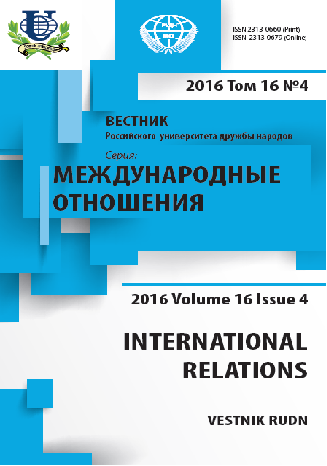Iran’s potential in fighting international terrorism
- Authors: Jabari N.H.1
-
Affiliations:
- Moscow State Institute of International Relations (MGIMO University), Ministry of Foreign Affairs of the Russian Federation
- Issue: Vol 16, No 4 (2016): Iran and India in the System of International Relations
- Pages: 665-676
- Section: ARTICLES
- URL: https://journals.rudn.ru/international-relations/article/view/15440
- DOI: https://doi.org/10.22363/2313-0660-2016-16-4-665-676
- ID: 15440
Cite item
Full Text
Abstract
Islamic Republic of Iran as a regional country with international capacities can be influential globally. The country’s geopolitical, energetic, cultural and ideological dimensions construct a notable potential for it in the international system. Today, considering the outbreak of religious salafist-takfiri fundamentalism in the Middle East with subsequent outspread of extremism and terrorism across the globe stretching from Asia, Africa, and Europe to America, Iran with its mentioned potentials can enhance its position in world politics through curbing terrorism and firmly fighting against it. In the present article the author analyzes the factors that construct Iran’s anti-terrorist capacity and its influence on the place of this country in modern world politics. He introduces the legal basis of activities of Iran in fight against terrorism, strategic vision of this country in this area. The main directions and formats of contemporary Iran’s counterterrorism cooperation is analyzed. The author expresses an opinion that Iran’s active and effective fight against international terrorism can reduce the expenses of counterterrorism measures in global scale and impair the potential of terrorist groups. This factor will also lead to the strengthening of Iran’s position in the system of international relations, to transformation of its role and rethink of Islamic Republic’s place in contemporary world politics.
About the authors
Nasir Hasan Jabari
Moscow State Institute of International Relations (MGIMO University), Ministry of Foreign Affairs of the Russian Federation
Author for correspondence.
Email: hjabbarinasir@gmail.com
Moscow, Russia
References
- Abdullakh, Khani A. (2005). Mezhdunarodnaya bezopasnost': vozmozhnosti i ugrozy. (na farsi). Tegeran.: Abrare moaser.
- Dekhgani, Firuzabadi S. (2008). Kontseptual'naya osnova vneshnei politiki Irana (na farsi). Tegeran.: Azad universitet.
- Esposito, J.L. (1990). The Iranian Revolution: Its Global Impact. ¬ Miami: Florida: International University Press.
- Hass, R. N. (2006). The New Middle East. Foreign Affairs, 4(19), pp. 38-57.
- Khafezniya, M., Zargani, S. (2007). Pozitsiya Irana v global'noi i regional'noi geopolitike( na farsi). Rakhborde difai, 18, pp. 88-95.
- Ibrakhimi. S. (2005). Pozitsiya Irana na regional'noi i mezhdunarodnoi arene(na farsi)// Khukumate islami, 4, pp. 132-133.
- Imanipur, M. (2007). Iran i region. Teoreticheskie i pragmaticheskie aspekty regional'noi politiki. [Iran and the region. Theoretical and pragmatical aspects of regional politics] Rol' i mesto Irana v regione. Ed. N.M. Mamedova, M. Imanipur. Moscow: Institut vostokovedeniya RAN.
- Izadi, Dzh. (2011). Strategiya effektivnogo i konstruktivnogo uchastiya Irana v mezhdunarodnoi sisteme. Rakhname siyasatgozari, 3. (in farsi).
- Kadkhudoi, A., Saed, N. (2015). Terrorizm i bor'ba s nim (na farsi). Tegeran.: Madzhmae solkhe islami.
- Kulagina, L. Akhmedov, V. (2015). Protivostoyanie Irana i IGIL v Sirii i Irake [Iran and IGILs’ standoff in Syria and Iraq ]. Vostochnaya analitika, 1, pp.8-15.
- Lebedeva, M.M. (2006). The Terrorist Threat to the World Political System. Connections. The Quarterly Journal, 32 (03), pp. 115-124.
- Nazarov, V. (2015). Global'nyi ekstremizm:ugroza miru, regional'noi i mezhdunarodnoi bezopasnosti [Global extremism: a threat to regional and international security]. Mezhdunarodnoe sotrudnichestvo evraziiskikh gosudarstv: politika, ekonomika, pravo, 3(4), pp. 5- 11.
- Purmekhrani, M. (2010). Geopoliticheskie problemy Irana na granitsakh. Tegeran: Nuavar. (in farsi).
- Rakhimpur, A. (2002). Geostrategicheskie razvitie sobytii v dvadtsat' pervom veke i regional'naya pozitsiya Irana(na farsi). Itilaate siyasi va iktisadi, 183, pp. 57-58.
- Renshon, S. E. (1999). Politicheskaya psikhologiya voiny v Persidskom zalive. Tegeran.: МИД. (in farsi).
- Rhodes, D. (2014). Salafist- Takfiri Jihadism: the Ideology of the Caucasus Emirate. Working paper. International Institute for Counter-Terrorism.
- Scott, A. (2006). The moral logic and growth of suicide terrorism. The Washington Quarterly, 29 (2), pp.127-147
- Shabestani, A. (2014). Bor'ba s terrorizmom. Tegeran.: Universitet Imam Khussein. (in farsi).
- Suleimanov, A. (2010). Saudovskaya Araviya, Iran, Turtsiya i Pakistan: vzaimootnosheniya v ramkakh OIK [Saudi Arabia, Iran, Turkey and Pakistan: cooperation within OIC]. Vestnik RUDN, seriya Mezhdunarodnye otnosheniya, 4, pp. 29-35.
- Vaezi, M. (2008). Strategiya konstruktivnogo vzaimodeistviya i printsipy vneshnei politiki Iran. Tegeran.: Tsentr strategicheskikh issledovanii (in farsi).
Supplementary files










